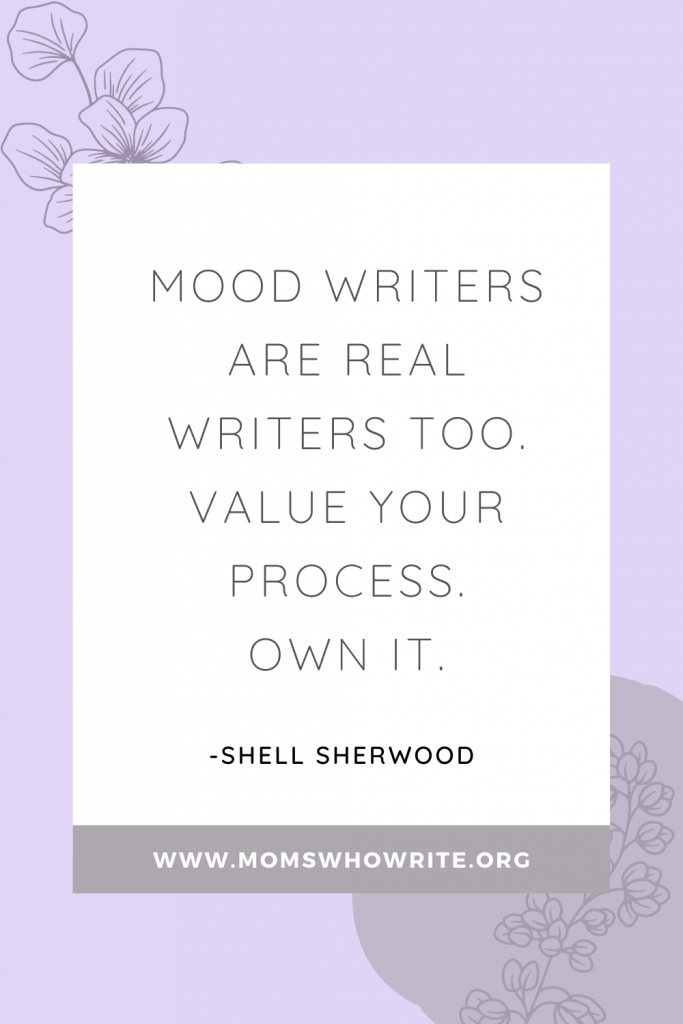I’m a mood writer. I never really knew what that was until I joined the online writing community.
Before, I thought that writing was just something I did sometimes because I didn’t always feel the burning desire. Now, I know this is just my style, and I can still be a writer even if I’m not working on a project 24/7.
The Mind of a Mood Writer
I currently have several WIPs cycling through my head and Scrivner and GoogleDrive. The ideas and inspiration come to me in spurts. I can’t predict which story will get more love and attention during these writing spats. There’s certainly no way to tell if another story idea will come along and put the rest of my projects to shame.
But when the writing fever hits, I run in whatever direction it takes me. I write in every spare moment until the urge is gone, and then, I step back to view what madness just came out.
Some of my best poetry has come out of mood writing. This sounds pretty obvious being that poetry seeps with emotion more than most other genres, but let me explain.
Mood Writing vs. Inspiration
There are times as a poet when I see something I have to write about: a beautiful sunrise, a uniquely shaped tree, a human who’s so overtaken by emotion I never want to forget them. In these cases, I may whip up a poem or gracefully jot some thoughts down in my journal. If it sparks a story idea, I’ll pop open a document and make some notes to think about for future scenes.
But this type of writing I’m speaking of—that’s bits of inspiration that spark ideas. You may run with them a while and then say, “Wow, that was nice.” That’s not exactly what happens to mood writers.
My mood writing periods are intense and obsessive. They’re inundated with ideas and free-flowing plots and verse, all-consuming, with no regard for anything else going on in my life.
Particularly during the week before my period, my brain constantly thinks in poetic verses. I walk around my home battling words in my head, listening to poetic voices that have to make it onto paper before I explode. Before the next set barges in.
But it doesn’t have to be poetry. For me, it usually is, but I’ve experienced these periods with other genres, too. It all depends on….can you guess? My mood.
The Cons of Mood Writing
The worst part of being a mood writer is it literally pains me not to write when the writing mood strikes. If I’m not emptying my brain and my heart and squeezing every last character out, my body physically aches.
I will cancel all non-urgent activities to make sure I’m available to write. I arm myself with notebooks, my Freewrite, my laptop, and my Notes app at all times. Just to make sure nothing slips through the cracks. Catching any words that arise to use for something, anything in the future. I savor every little bit, knowing the flow won’t last forever.
Sounds pretty strange to some I bet. Possibly a little unproductive to those writers who can wake up every morning and start right where they left off.
Sometimes, mood writers get a bad rap for not being fully committed or scatterbrained or unfocused. How will we ever finish a project if we only passionately write when the mood strikes us? We should be scheduling writing time every day, writing words every day, right? Even if they’re trash, the general advice is we should be more stringent with our writing.
But let me assure you—mood writers are more than committed to their craft. We just operate on a different frequency.
Mood Writers are Still Productive
Sure, I may only have a week or so a month of fast-paced progress on my WIP, where I want to write more than I want to breathe. That doesn’t mean I’m unproductive when the mood doesn’t strike. These are the times I work on my craft rather than create.
Reading
I read books (lots of books) often in the genre I was just inspired to write in last, absorbing techniques that other authors use by jumping into their worlds. I never thought of reading fiction or poetry as studying, but it certainly is if you’re a creative writer.
Non-Creative Writing
Since I’m also a freelance writer, I fill my schedule with articles on topics I need to research, articles that don’t take creativity to put together. It keeps my fingers and my mind moving, without the pressure of plot twists and character arcs and hours in a thesaurus to find the right words.
Editing
Editing is also a huge part of this downtime. When the mood writing period is complete, I will go back and read what spilled out of my head. I begin hacking away, rearranging, making sense of the direction. Rarely do I come up with new ideas, just manage what I have and get it set for when the next mood writing session hits me. I cannot force myself to be creative; writing just to write doesn’t work for me.
Recharging
But sometimes, I don’t do anything pertaining to writing. There are times after a mood-writing kick when I realize I need a break, especially if what came out was particularly dark, exhausted cries from within. I recharge. I do other creative things to keep my spirit up. It goes without saying that mood writers are pretty well in tune with their emotions. It’s a bit easier for us to detect when we’re depleted. And unless we take the time to recharge, our next writing period may not come.

Mood Writing is a Different Way to Create
Not writing every day doesn’t mean mood writers aren’t real, serious, or passionate writers. We may not be able to march to the same drum as writers who schedule time every day to put words on paper. Camp Nano and NaNoWriMo can seem daunting unless your creative brain is in overdrive for a whole month. It happens. Not often to me, but it can.
Value your process. Don’t spend your creative downtime comparing your chaotic writing style with others or trying to fake inspiration only to disappoint yourself. Writing words just to write words because people say Write every day! is not a hard and fast rule. If you don’t want to, don’t.
We’re talking apples and oranges here. Do what works for you. Honor your unique craft and own it.
We want to hear your story
We are always looking for more personal narratives and writing journeys to share with our community. Imposter syndrome affects all of us in the creative community. The more we share our successes, our failures, and our challenges, the more support we can build to help overcome this beast when it hits.
Everyone has a unique story, and we want to hear yours. Find our blog submission form here to share.
About the Writer: Shell Sherwood is a poet, fiction writer, freelancer, and creator of silly children’s stories, who could live on coffee, pastries, and romantic tragedies. She lives in Hudson Valley, NY with her fiancé and three boys, and aspires to own a small writing getaway in every climate. Shell is currently working on her debut poetry collection. Learn more about Shell and follow her writing journey via her author blog, Instagram, and TikTok.

2 thoughts on “A mood writer is a real writer too—just different”